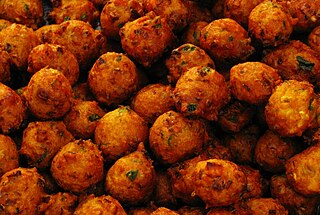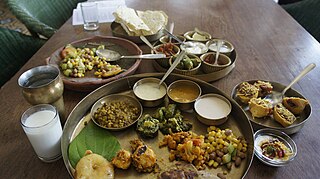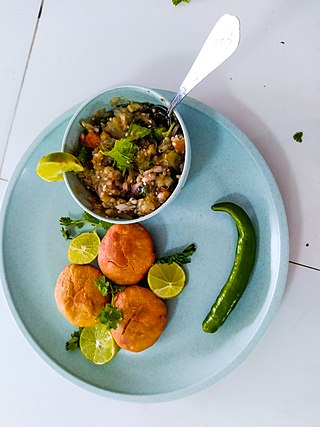
Tapioca is a starch extracted from the tubers of the cassava plant, a species native to the North and Northeast regions of Brazil, but whose use is now spread throughout South America. It is a perennial shrub adapted to the hot conditions of tropical lowlands. Cassava copes better with poor soils than many other food plants.

Sago is a starch extracted from the pith, or spongy core tissue, of various tropical palm stems, especially those of Metroxylon sagu. It is a major staple food for the lowland peoples of New Guinea and the Maluku Islands, where it is called saksak, rabia and sagu. The largest supply of sago comes from Southeast Asia, particularly Indonesia and Malaysia. Large quantities of sago are sent to Europe and North America for cooking purposes. It is traditionally cooked and eaten in various forms, such as rolled into balls, mixed with boiling water to form a glue-like paste (papeda), or as a pancake.

Bonda is a deep-fried South Indian potato snack that has various sweet and savory versions in different regions. The most common is aloo bonda, and other region-specific variations include potato replaced with sweet potato, tapioca, grated pineapple, green peas, paneer, or other ingredients.

Palak paneer or palak chhena is an Indian dish consisting of chhena or paneer in a thick paste made from puréed spinach, called palak in Hindi, Marathi, Gujarati, and other Indian languages.
Maharashtrian or Marathicuisine is the cuisine of the Marathi people from the Indian state of Maharashtra. It has distinctive attributes, while sharing much with other Indian cuisines. Traditionally, Maharashtrians have considered their food to be more austere than others.

Gujarati cuisine is the cuisine of the Indian state of Gujarat. The typical Gujarati thali consists of rotli, dal or curry, rice, and shaak. The thali will also include preparations made from pulses or whole beans such as moong, black eyed beans etc., a snack item (farsaan) like dhokla, pathra, samosa, fafda, etc. and a sweet (mishthaan) like mohanthal, jalebi, sevaiya etc.

Dahi puri is an Indian snack food which is especially popular in the state of Maharashtra. The dish is a type of chaat and originates from the city of Mumbai. It is served with mini-puri shells (golgappa), which are also used for the dish pani puri. Dahi puri and pani puri chaats are often sold by the same vendor.

Khichdi or khichri is a dish in South Asian cuisine made of rice and lentils (dal) with numerous variations. Variations include bajra and mung dalkhichri. In Indian culture, in several regions, especially in the northern areas, it is considered one of the first solid foods that babies eat.

Thalipeeth is a savoury multi-grain flatbread popular in Western India, particularly in the state of Maharashtra. The flour for thalipeeth, called bhajanee, is prepared from roasted grains, legumes and spices. The ingredients include grains such as rice, wheat, bajra, and jowar; legumes such as chana, and urad; and spices, most commonly coriander and cumin seeds. When preparing the dough, other ingredients such as onion, fresh coriander, other vegetables and spices are added. Thalipeeth is usually served with butter, ghee, or yogurt. The dish is popular in Maharashtra and north Karnataka, and it is also made with regional variations in Goa.
Bhojpuri cuisine is a style of food preparation common among the Bhojpuri people of Bihar, Jharkhand and eastern Uttar Pradesh in India, and also the Terai region of Nepal. Bhojpuri foods are mostly mild and tend to be less hot in terms of spices used. The cuisine consists of both vegetable and meat dishes.

Sabudana vada, also called 'sabu vada', is a traditional deep-fried fritter from Maharashtra, India. It is made from tapioca pearls (sabudana), mashed potatoes, peanuts and spices. It is often served with a spicy green chutney along with hot chai and is best eaten fresh. In other parts of the country, Sabudana vada is the best option to have when fasting. It's usually eaten during religious festivals and during fast/vrat/upvaas, especially in Navratri vrats. Like all vadas, these are best eaten fresh. Sabudana vadas are crunchy and "melt in the mouth."
Bihari cuisine is eaten mainly in the eastern Indian state of Bihar, as well as in the places where people originating from the state of Bihar have settled: Jharkhand, Eastern Uttar Pradesh, Bangladesh, Nepal, Mauritius, South Africa, Fiji, some cities of Pakistan, Guyana, Trinidad and Tobago, Suriname, Jamaica, and the Caribbean. Bihari cuisine includes Angika cuisine, Bhojpuri cuisine, Maithil cuisine and Magahi cuisine.

A great variety of cassava-based dishes are consumed in the regions where cassava is cultivated.

Litti is a whole wheat flour dough ball stuffed with a spiced mixture of sattu. Litti, along with chokha, is a complete meal that originated from the Bhojpuri region of the Indian states of Bihar and Uttar Pradesh. It is also a popular street food in small towns and cities.

Kachumber, or cachumber, is a salad dish in Indian cuisine consisting of fresh chopped tomatoes, cucumbers, onions, unripe mangoes, lemon juice, and sometimes, chili peppers. Its regional variation in south India is known as Kosambari. Sometimes, raita, a similar dish made with curd, is also called kachumber.

Gujarati kadhi is a Gujarati version of kadhi. It is a very popular Gujarati dish made from buttermilk or dahi (yogurt) and gram flour. Kadhi is an essential part of Gujarati cuisine.
Saggubiyyam (sabudana) punugulu is a snack food typically made in Andhra Pradesh, India. They are sometimes called challa punugulu owing to the use of buttermilk or curd in the recipe, preferably sour.

Sai bhaji is a Sindhi vegetarian curry, consisting of dal (lentils), palak (spinach) and other vegetables. It forms a staple part of the local cuisine and is considered a rich source of nutrition due to its mix of various greens.

Sabudana papar is a crisp flatbread from the Indian subcontinent, being a type of papar. It is commonly served as a street food in India as well as during festivals.

Aloo chokha, or aloo bharta, is a dish made by mashing boiled soft potatoes and mixing chopped chilies, onion, salt and mustard oil. In the state of Bihar, it is served as one of the side dishes as part of litti chokha. It is usually eaten with Khichdi in the Eastern part of Indian subcontinent.




















